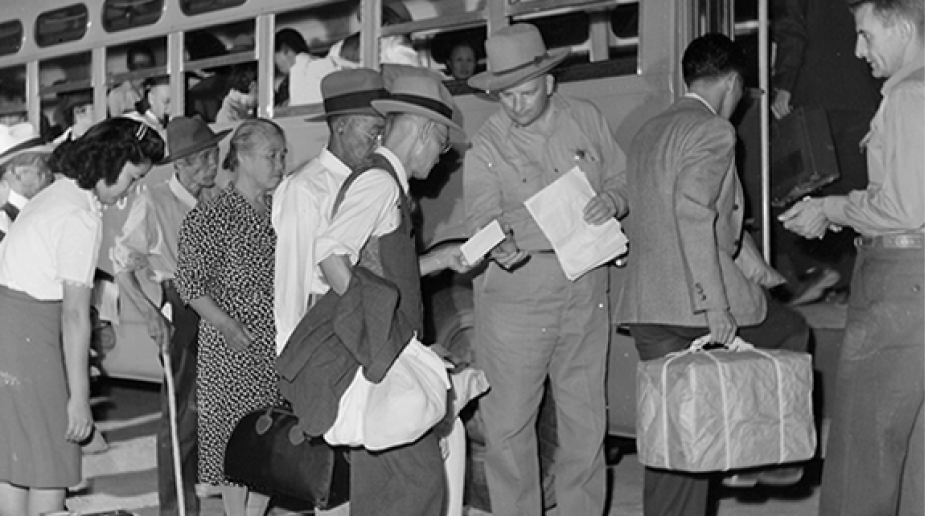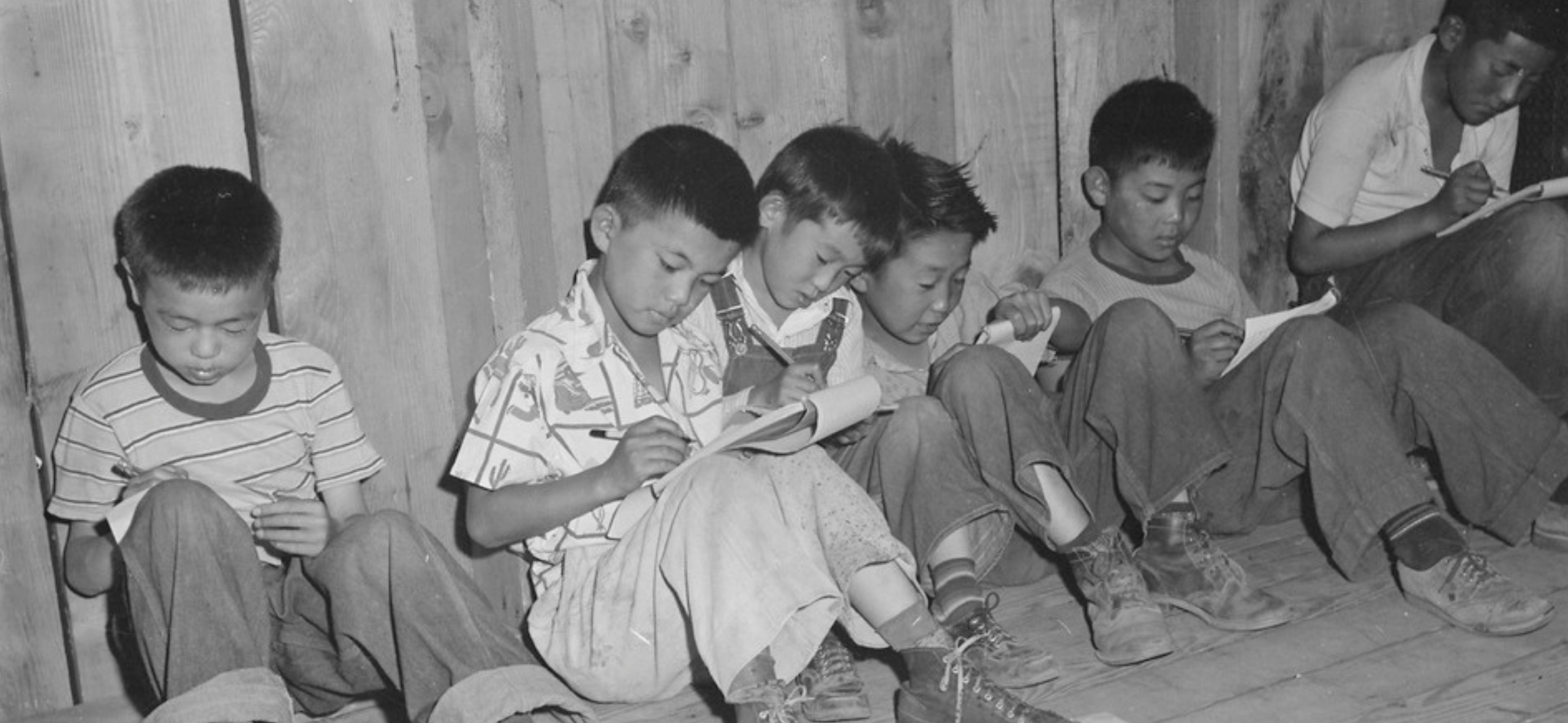About the Organization
The Japanese word densho means “to pass on to future generations,” or “to leave a legacy.” Read about our history and mission.
Densho is not a museum for the public to visit. Our collections and exhibits of Japanese American resources are all digital and displayed exclusively on the Densho website. Our office in Seattle is for administration and video production only.
No. All of Densho’s resources are free to teachers, students, and the general public. The Densho Digital Repository of video interviews, photos, and documents can be used free of charge.
Densho is supported by contributed income from government and foundation grants, our annual fundraising event, and individual donations.
Densho interviewees donated their life stories to Densho for preservation and education. We do not have permission to arrange for interviewing or researching by others. Depending on where you live, you could contact the regional Japanese American civic or cultural organization or Nisei veterans chapter for possible interviewees.
For sites of interest in your area, you could consult your local history museum, historical society, or public library reference desk for suggestions.
Densho does not have a policy of promoting other websites. We do recommend selected educational websites for further research on the Additional Resources page.
Densho is not a publisher, and we do not have special access to publishing houses. While we occasionally present author talks as public education programs, we do not as a rule promote specific books. The same is true of films and other artwork.
Please visit Share Your Collections for more information on donating your materials to Densho.
Using Densho Content
Yes. To view examples of citations for different kinds of content from the Digital Repository, see “How To Cite Densho”.
It depends. You do not need Densho’s permission if you can answer yes to all of the following questions:
- Is the use for either personal or limited use in teaching, scholarship, or research?
- Is the portion of your project that uses Densho materials small in relationship to the size of the project as a whole?
- Is the use non-commercial?
- Is the object labeled as ‘free use’ or ‘public domain’?
If you answered “no” to any of the questions above, you need to request permission from Densho to use our materials.
It depends on your request. Densho may charge service and handling fees if you need Densho staff to research, identify, duplicate, or send materials to you. There may also be usage fees if you want to publish or distribute Densho materials. More information can be found here.
The first step is to make your request online. After we approve a completed request, we will create and send you a Restricted Use Agreement and an invoice. When we receive the signed Restricted Use Agreement and payment, we will send our written permission along with the requested materials. Please allow 1-2 weeks to process the requested materials.
About the Digital Repository
Densho continues to selectively collect the life histories of Japanese Americans and others who can speak about the World War II incarceration. See the Oral History page for more information.
Densho is collecting life stories to represent a wide range of perspectives and experiences from a diverse geographic range. Densho does not have the resources to interview all candidates. We are interested in recording the experiences of individuals whose stories are not well documented.
You may fill out a short online interview nomination form or download a print version:
Densho works with other nonprofit organizations and volunteer groups who have the resources to preserve their communities’ life stories. For more information, contact us at info@densho.org and ask about our Community Partner program.
After reviewing their interview tape, interviewees sign a release form. Densho retains copyright to the video interview and transcript. The video life histories are entered in the Densho Digital Repository and are made available to users for educational purposes.
Please see the Oral History page for more information.
We honor the confidentiality of our interviewees. If you would like to communicate with a particular person in our Digital Repository, you may send your request and contact information to info@densho.org or call 206-320-0095. If possible, we will forward your request to the person, and they can choose to respond.
We encourage researchers to use the topics list and Search function of our Digital Repository to find suitable interview clips and photos. We also have a YouTube channel with highlight videos.
Densho does not have a speakers bureau. We cannot send former detainees or other speakers to your group. Depending on where you live, you could contact the regional Japanese American civic or cultural organization or Nisei veterans chapter for potential speakers.
Densho interviewees donated their life stories to Densho for preservation and education. We do not have permission to arrange for interviewing or researching by others. Depending on where you live, you could contact the regional Japanese American civic or cultural organization or Nisei veterans chapter for possible interviewees.
For sites of interest in your area, you could consult your local history museum, historical society, or public library reference desk for suggestions.
The Densho Digital Repository contains diverse historical photographs from institutional and private collections. Photographs date from early immigration in the 1880s to redress in the 1980s and beyond. Visit the Densho Digital Repository to learn more about our archival holdings.
Documents include government reports and communications, paperwork from the incarceration camps, personal letters, diaries, and artwork. Also in the archive are newspapers from all ten War Relocation Authority Camps.
Yes, Densho continues to scan and digitize historical photos and papers that document the World War II incarceration of Japanese Americans and related issues.
For more information on sharing your materials, please see Share Your Collections.
How to Cite Densho
When using Densho interviews and photographs, please include the following information for proper citation. The exact format used will vary depending on the citation style chosen (e.g., MLA, Chicago, APA, etc.) and whether it appears in footnotes or a bibliography. However, the pieces of information described below should always be included. In general, the first citation will follow the long format and subsequent citations will follow the short format.
Interviews:
Long format:
Narrator full name, interview by interviewer full name, interview date, interview collection (if other than Densho), Densho.
Example: Frank Emi, interview by Frank Abe, February 23, 1993, Frank Abe Collection, Densho.
Short format:
Narrator last name, interview by interviewer last name, interview date, collection, Densho.
Example: Emi, interview by Abe, 2/23/93, Frank Abe Collection, Densho.
Photographs and Images:
For placement on an acknowledgement page, please use:
Densho is a digital archive of videotaped interviews, photographs, documents, and other materials relating to the Japanese American experience. Additional information on the project is available at www.densho.org
Photographs & Images:
Title (Densho ID), Densho, Collection Name.
Example: “Boy Scout Camping Trip” (ddr-densho-15-1), Densho, the Mitsuoka Family Collection.
Resources for Conducting an Oral History Interview
Conduct your own oral history interviews using resources and tips from Densho.
Stay Informed: Join The Mailing List

